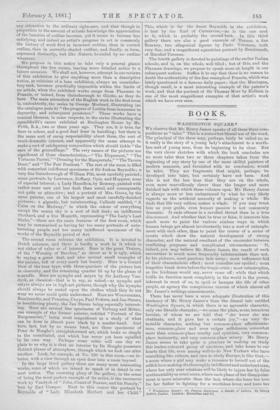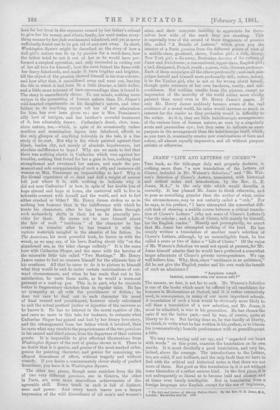BOOKS.
WASHINGTON SQUARE.* WE observe that Mr. Henry James speaks of all those three corn- positions as " tales." This is a somewhat liberal use of the word. The principal of the three may, perhaps, fairly be called so, as it really is the story of a young lady's attachment to a worth- less sort of young man, from its beginning to its close. But the very clever sketches with which the book concludes are no more tales than two or three chapters taken from the beginning of any story by one of the more skilful painters of modern manners, and furnished with no conclusion, would be tales. They are fragments that might, perhaps, be developed into tales, but certainly have not boon. And this is not the less true that they are on the whole, even more marvellously clever than the longer and more finished tale with which these volumes open. Mr. Henry James is always more or less embarrassed by what he very likely regards as the artificial necessity of making a whole. He finds that life very seldom makes a whole. If you may trust him as your guide, even human passion is not commonly dramatic. It ends oftener in a ravelled thread than in a true daouertient. And whether that be true or false, it interests him much more to paint the various aimless ways in which human beings get almost involuntarily into a sort of entangle- ment with each other, than to paint the course of a series of events which show the natural development of strong character, and the natural resultant of the encounter between conflicting purposes and complicated circumstances. If, indeed, you may believe Mr. Henry James, the result of such encounters is much more frequently indeterminate than not. In his pictures, most passions fade away ; most influences fail of their characteristic effect; most comedies are spoiled ; most tragedies break down before the tragic crisis ; most catastrophes, as the Irishman would say, never come off ; while that which fulfils its function most completely in the world is the power, inherent in most of us, to spoil or hamper the life of other people, an agency the conspicuous success of which almost all Mr. James's writings commemorate.
There has never been a more adequate illustration of this tendency of Mr. Henry James's than the dismal tale entitled Washington Square, in which there is no agreeable character, only one likeable character,—wo mean the plain, mute, tenacious heroine, of whom we are told that " she knew she was obstinate, and it gave her a certain joy,"—no very de- testable character, nothing but common-place affectionate- ness, common-place and even vulgar selfishness, somewhat more than common-place cruelty and cynicism, very common- place insincerity, and very common-place misery. Mr. Henry James seems to take quite a pleasure in making us study this leaden-coloured group of emotions, and take home to our hearts that life, even among well-to-do New Yorkers who have something like culture, and care to study Europe, is like that,— a scene where a girl may make a romance to herself out of the selfish love-making of a thoroughly indifferent and underbred man, where her only near relations will be likely to injure her by false sentimentality or cruel scorn, where each phase of her disappoint- ment is more miserable than the last, where she loses her love for her father in fighting for a worthless lover, and loses her * Washington Square the Pension Beaurepas a Bundle of Letters. By Fleury James, Junior. London: Macmillan and Co. love for hor lover in the exposure caused. by her father's refusal to give her his money, and where, finally, her aunt makes every- thing meaner by her fade sentimental falsehood, and yet is never sufficiently found out to be got rid of and sent away. In short, Washington Square might be described as the story of how a dull girl's nature was lit up by passion for a mock-hero, how the father tried to cut it out of her as he would have per- formed a surgical operation, and only succeeded in cutting out of her all love for himself ; how the aunt fanned the flame with her fancy falsehoods, and made it burn brighter and brighter, till the object of the passion showed himself in his true colours ; and how after that, it smouldered away and went out, leaving the life in which it had been lit a little blunter, a little duller, and a little more tolerant of bare surroundings than it found it. The story is marvellously clever. To our minds, nothing more unique in the presenting of human nature than Dr. Sloper's cold-hearted experiments on his daughter's nature, and utter failure to do anything except rob her of her admiration for him, has ever been given us ; nor is Mrs. Penniman's silly love of intrigue, and her brother's scornful treatment of • it, less admirably drawn. Catherine's dumb, slow, tena- cious nature, too,—which, in spite of its occasionally rather needless and meaningless lapses into falsehood, affords us the only glimpse of anything tolerable in the tale, is a fine study of its sort. But why is the whole painted against that blank, leaden sky, not merely of absolute hopelessness, but absolute indifference to hope ? Why are we made to feel that there was nothing elastic in Catherine which rose against her troubles, nothing that found for her a gain in loss, nothing that strengthened and sweetened her nature, and made the per- manent and solo companionship of such a silly and insincere old woman as Mrs. Penniman an impossibility to her P Why is the dismal experience of so dead. and dull a weight of sorrow left just where it is, with nothing to indicate why it did not soar Catherine ? or how, in spite of her double loss of hope abroad and hope at home, she contrived still to live in tolerable content with herself and the world, and not to feel either crushed or bitter P Mr. Henry James strikes us as in nothing less humane than in -the indifference with which he treats his .characters, after he has brought them through such melancholy shifts in their lot as he generally pro- vides for them. He seems not to care himself about the fate of such " residuum " of the character he has created as remains after he has treated it with the various materials mingled. in the alembic of his fiction. In The American, his most powerful book, he leaves us with the wreck, as we may say, of his hero, floating about idly "on the abandoned sea, as the tides change sullenly." It is the same here with Catherine Sloper, and the same with the heroine of the miserable little tale called. "Two Meetings." Mr. Henry James seems to feel no concern himself for the ultimate fate of his creations. All that he cares to do is to picture to himself what they would be and do under certain combinations of out- ward circumstances, and when lie has made that out to his satisfaction, he casts them aside, as he would a worn-out garment or a used-up pen. This is, in part, why he succeeds better in fragmentary sketches than in regular tales. He has no sympathy at all with the providences of fiction ; he does not care to deal out to each character his meed of final reward and punishment, however nicely calculated to suit the actual poetical justice or injustice of the universe as he knows it. He has no interest in the moral equities of life, and cares no more in this tale, for instance, to estimate what Catherine Sloper has gained and lost by her dreary love-story, and the estrangement from her father which it involved, than he cares what may result to the proprietresses of the two pensions in his second and third pieces, from the departure of their various guests. is impossible to give effectual illustrations from Washington, Square of the sort of genius shown in it, There is no doubt that it is genius, and genius of the most marked order, genius for painting character, and genius for conceiving un- alloyed. dismalness of effect, without tragedy and without comedy. If you desire a consummately clever study of perfect dreariness, you have it in Washington Square.
The other two pieces, though mere snatches from the life of two very different pensions, one in Geneva, the other in Paris, are even more marvellous achievements of dis- agreeable skill. Every touch in each is full of distinct- ness and power. And every touch leaves you a deeper impression of the wild discordance of all men's and women's aims, and their complete inability to appreciate for them- selves how wide of the mark they are shooting. This is especially true of the second of these fragments of pension life, called. "A Bundle of Letters," which gives you the interior of a Paris pension from the different points of view of a middle-class, go-ahead, clever, Yankee girl ; a rich, dressy,. New York girl ; a die-away, Bostonian devotee of the culture of Pater and Swinburne ; a conventional, upper-class, English girl ;. a bad, dissipated, French youth ; a gross, vain, German professor. Each of them misjudges all the others profoundly ; and each mis judges herself and himself more profoundly still; unless, indeed, it be the Yankee girl, who is not so far wrong about herself, though quite unaware of her own hardness, vanity, and self- confidence. But nothing results from the picture, except an impression of the anarchy of the world rather more vividly painted than usual even in Mr. Henry James's pages. If only Mr. Henry James suddenly became aware of the real existence of a moral world, his tales would increase as much in interest for the reader as they probably would in difficulty to the writer. As it is, they are little kaleidoscopic arrangements of the various hues of human nature, as seen by a singularly acute and passionless eye ; but they seem to indicate no more purpose in the arrangement than the kaleidoscope itself, which, as you turn it, constantly creates new combinations of form and colour, all almost equally impressive, and all without purpose• artistic or otherwise.



































 Previous page
Previous page